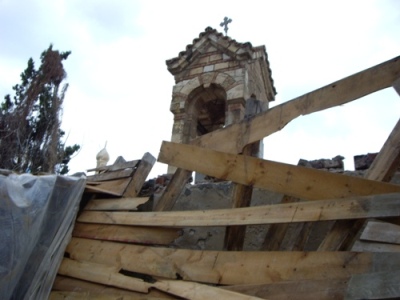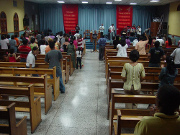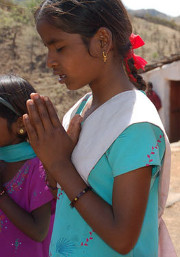By Dan Wooding
Founder of ASSIST Ministries
JUBA, SOUTH SUDAN (ANS) -- Government bombing of ethnic Nuba civilians in a predominantly Christian town of Sudan last month - killing a mother of seven children - is further evidence that officials are trying to rid the country of Christians, area Christian leaders said.
Clip from Nuba News about the bombing
|
According to Morning Star News*, Sudanese government forces bombarded Heiban in war-torn South Kordofan state on Sept. 27, killing the Christian mother of seven and wounding at least six others, the sources said.
They said bombs from an Antonov airplane dropped five bombs near a crowded market, killing Asia Omer Kuku (mistakenly identified as Hassia Karri Kuku in other media reports, according to a relative). The youngest of her seven children is 4 months old. Kuku was working in a field near a church building when the bomb hit, according towww.NubaReports.com.
"At exactly 10:30 a.m. Sept. 27, a Sudan government plane dropped five bombs in Heiban town," one source said. "The bombs wounded six civilians and killed a woman, Asia Omer Kuku, leaving behind seven children, the youngest being 4 months old."
Howeda Hassan, another Christian mother of seven children, sustained a serious stomach wound. She was described as in critical situation but without medical care, added Morning Star News.
Other Christians wounded in the bombing of the town south of Kadugli, capital of South Kordofan state, was a son of the Rev. Yagoub Ibrahim Tia of the Sudanese Church of Christ, area Christians told Morning Star News.
Manas Yagoub Ibrahim Tia, 15, sustained wounds to his right leg and burns on his face. The sources said another Christian, 65-year-old Martha Kuku Bilal, received injuries to her face.
Samira James Kuku, 70, suffered a broken right leg; both her arms were also broken. Firous Silas was wounded in her right leg, and 40-year-old Abdelrasoul Angolo sustained a wound in his right shoulder, according to the area sources.
 |
There have been claims of ethnic cleansing
in South Kordofan (Photo: Reuters) |
South Kordofan, where war raged during Sudan's 1983-2005 civil war, saw fighting break out anew in June 2011 when Khartoum took military action against gunmen who were once allied with the now independent South Sudan. Fighting between President Omar al-Bashir's forces and the Sudan People's Liberation Movement-North (SPLM-N) also spread to Sudan's Blue Nile state in September 2011.
When Sudan's Comprehensive Peace Agreement was signed in 2005, the people of South Kordofan were to vote on whether to join the north or the south, but the state governor - wanted for war crimes, as is Bashir - suspended the process, and Khartoum instead decided to disarm the SPLM-N by force.
The Sept. 27 attack in Heiban hit about 100 yards from a crowded market where civilians from surrounding villages come weekly to sell their possessions in order to buy food. Worship buildings in the area belonging to the Sudan Presbyterian Evangelical Church, Roman Catholic Church and Sudanese Church of Christ were not hit, and services were not taking place as local Christians have come to fear air strikes.
But sources said another Christian, teacher Martha Kalu, sustained a serious forehead injury and was also wounded on other areas of her body.
"How can we accept such thing?" said one long-time friend of Kalu.
 |
Part of Heiban Bible College after bombing
|
Earlier this year, Heiban Bible College in the same town was reduced to ashes when an Antonov plane bombed it on Feb. 1; there were no injuries. Since early August, Sudan has reportedly dropped more than 81 bombs on 11 villages.
Islamic government officials consider the various Nuba ethnicities as enemies or "infidels" in their campaign to clear the region of non-Arab races and Christianity, sources said.
Sudan's Interim National Constitution holds up sharia (Islamic law) as a source of legislation, and the laws and policies of the government favor Islam, according to the U.S. Department of State. Bashir has warned that Sudan's constitution will become more firmly entrenched in sharia.








